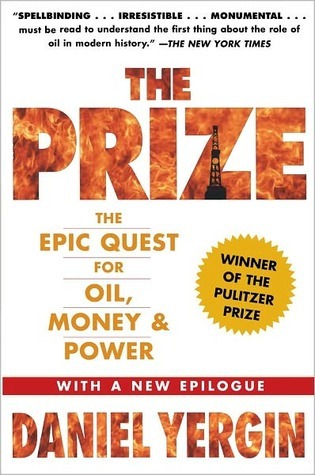More on this book
Community
Kindle Notes & Highlights
Read between
October 20 - November 24, 2018
“To commit the Navy irrevocably to oil was indeed ‘to take arms against a sea of troubles,’ ” said Churchill. But the strategic benefits—greater speed and more efficient use of manpower—were so obvious to him that he did not dally. He decided that Britain would have to base its “naval supremacy upon oil” and, thereupon, committed himself, with all his driving energy and enthusiasm, to achieving that objective.
The most popular was camphene, a derivative of turpentine, which produced a good light but had the unfortunate drawback of being highly flammable, compounded by an even more unattractive tendency to explode in people’s houses.
With the advent of drilling, there was no shortage of rock oil. The only shortage now was of whiskey barrels, and they soon cost almost twice as much as the oil inside them.7
rock oil emits a dainty light; the brightest and yet the cheapest in the world; a light fit for Kings and Royalists and not unsuitable for Republicans and Democrats.”
Oil was bought and sold on three bases. “Spot” sales called for immediate delivery and payment. A “regular” sale required the transaction to be completed within ten days. And the sale of “futures” established that a certain quantity would be sold at a certain price within a specified time in the future.
Tall and thin, he struck others as solitary, taciturn, remote, and ascetic. His unbending quietness—combined with the cold, piercing blue eyes set in an angular face with a sharp chin—made people uneasy and fearful. Somehow, they felt, he could look right through them.
Rockefeller was the single most important figure in shaping the oil industry. The same might arguably be said for his place in the history of America’s industrial development and the rise of the modern corporation.
Indeed, in the last three and a half decades of the nineteenth century, as at no other time in American history, the business of America was truly business, and it was to this magnet that the energies, ambitions, and brains of young men were irresistibly drawn.
“It is not the business of the public to change our private contracts.”
“We can’t be like the old German professor who as long as he can get his black bread and beer is content to spend his whole life studying the fuzz on a bee!”
“Simplicity rules everything worth while, and whenever I have been up against a business proposition which, after taking thought, I could not reduce to simplicity, I have realized that it was hopelessly wrong and I have let it alone.”
“It is rather as though the owners of the premier cru vineyards in the Gironde went about preaching the virtues of Scotch whisky as a beverage.”
chosen as the Republican candidate because among other reasons he “looked like a President,”
“It would have been possible to pick a worse man for Secretary of the Interior,” the conservationist added, “but not altogether easy.”
“an illness that was part terror, part shame, and part utter confusion!”
“Never give orders—give instructions . . . . Make a game out of your work . . . . The greatest dividend in human life is happiness.”
“Of all the grasping individuals I have ever met,” he wrote to the president of one of Shell’s American subsidiaries, “the American bankers . . . absolutely take the cake.”
“I was the host and I said if it was his religion that made him say such things, my religion prescribed as an absolute sacred rite smoking cigars and drinking alcohol before, after, and if need be during, all meals and the intervals between them.”
“For the first time in the economic history of Italy,” the United States embassy in Rome reported with some wonder in 1954, a government-owned entity in Italy “has found itself in the unique position of being financially solvent, capably led, and responsible to no one other than its leader.”
The sheikhs begged the British to maintain their presence. “Who asked them to leave?” asked the ruler of Dubai. The Amir of Bahrain was blunter. “Britain could do with another Winston Churchill,” he said. “Britain is weak now where she was once so strong. You know we and everybody in the Gulf would have welcomed her staying.”
A senior executive of one of the majors dismissed oil futures “as a way for dentists to lose money.”
“Not on your life. We all swing together or not at all. On this point, I am as stubborn as Mrs. Thatcher.”


